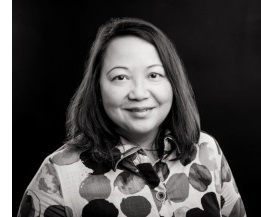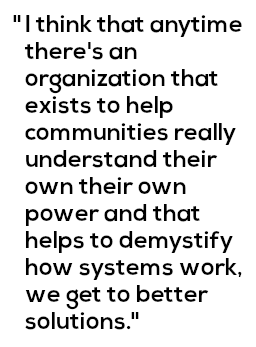

 Bo Thao-Urabe, the founding
Executive and Network Director of the Coalition of Asian American Leaders (CAAL), has
been helping others in her community since she was a child. As a
refugee child from Laos, she was quicker to learn English than her
parents who needed her help in many day-to-day situations. This
experience led her to question the types of hurdles that exist for
those who don’t have the resources or relationships to easily
navigate through life in America. “I think along the way, I just
started to question a lot of things like, why are things set up this
way? Why are our systems really set up to catch people doing bad
things versus help people really thrive and prosper,” explains Bo,
“Those kinds of experiences really sort of led me to both work in a
field where I feel closest to the people who are impacted by
systemic inequities and systemic barriers to really being able to
self determine.”
Bo Thao-Urabe, the founding
Executive and Network Director of the Coalition of Asian American Leaders (CAAL), has
been helping others in her community since she was a child. As a
refugee child from Laos, she was quicker to learn English than her
parents who needed her help in many day-to-day situations. This
experience led her to question the types of hurdles that exist for
those who don’t have the resources or relationships to easily
navigate through life in America. “I think along the way, I just
started to question a lot of things like, why are things set up this
way? Why are our systems really set up to catch people doing bad
things versus help people really thrive and prosper,” explains Bo,
“Those kinds of experiences really sort of led me to both work in a
field where I feel closest to the people who are impacted by
systemic inequities and systemic barriers to really being able to
self determine.”
“And then along the way, I saw a lot of just gaps in terms of
organizations that didn't exist for me or my family or my community,
and just felt like why not, right?” And with that approach, Bo went
on to co-found the Asian
Pacific Institute on Gender-Based Violence, Hmong Women Achieving
Together, Sisterhood Laos, RedGreen Rivers, Building Our Future: A Global Campaign,
and the Building
More Philanthropy with Purpose (BMPP) Giving Circle.
Now with the Coalition of Asian American Leaders (CAAL), a social
justice network of 4,000 Asian Minnesotan leaders, Bo continues
helping those in the AAPI community. CAAL was created as “a network
that equips and uplifts leaders, develops and takes action on shared
agendas, and build across communities towards equity, justice, and
prosperity.”
 Throughout this all, one piece of advice that she has
kept close is what her mother told her when, as a teen, she
complained about having to translate once again for the family.
After letting Bo yell about how unfair it was that she had to do all
the translating. Her mother let her finish. “And then after that,
she said, you know, don't you ever do that again. You know, you are
very fortunate and lucky that you have a skill that is useful to
people. And that is the purpose of life, right? To be useful because
when you are not useful, you don't have any skills that are helpful
to people. You can believe that nobody will be waiting for you, ”
recounts Bo.
Throughout this all, one piece of advice that she has
kept close is what her mother told her when, as a teen, she
complained about having to translate once again for the family.
After letting Bo yell about how unfair it was that she had to do all
the translating. Her mother let her finish. “And then after that,
she said, you know, don't you ever do that again. You know, you are
very fortunate and lucky that you have a skill that is useful to
people. And that is the purpose of life, right? To be useful because
when you are not useful, you don't have any skills that are helpful
to people. You can believe that nobody will be waiting for you, ”
recounts Bo.
And so she uses her skill to continue helping those in the AAPI
community who need assistance but tend to be overlooked. “People
just ignore them as if, like Asian Americans are not supposed to
have needs are not supposed to ask those questions or, you know, you
all must be rich.” The model minority myth, as Bo explains, “came at
a time when I think black communities were organizing their own
power and realizing that they could demand for things to be
different. Asian Americans went from the community that was targeted
for many things to the community that was touted as the model
minority, not a response to us and what we need it but a response to
another racial population that was demanding their rights and their
freedoms.”
“I think that having the data is to recognize history, but also to
recognize that nuance matters if we want better outcomes for
everybody,” continues Bo, “but also, to understand when and how we
are used as a wedge to other communities and that we should not
accept that.” Bo goes on to explain that while Asian Americans are
not a monolithic culture, more attention can be gained by being seen
as a larger bloc. However, it is a fine balance between getting AAPI
voices heard and losing the complexities of each culture. “I think
that [Asian American] can't be an identity that we just accept
as-is,” says Bo.
Through CAAL, Bo is able to help Asian communities tell their own
individual stories and make sure that their voices aren’t lost. “I
think that anytime there's an organization that exists to help
communities really understand their own their own power and that
helps to demystify how systems work, we get to better solutions.”